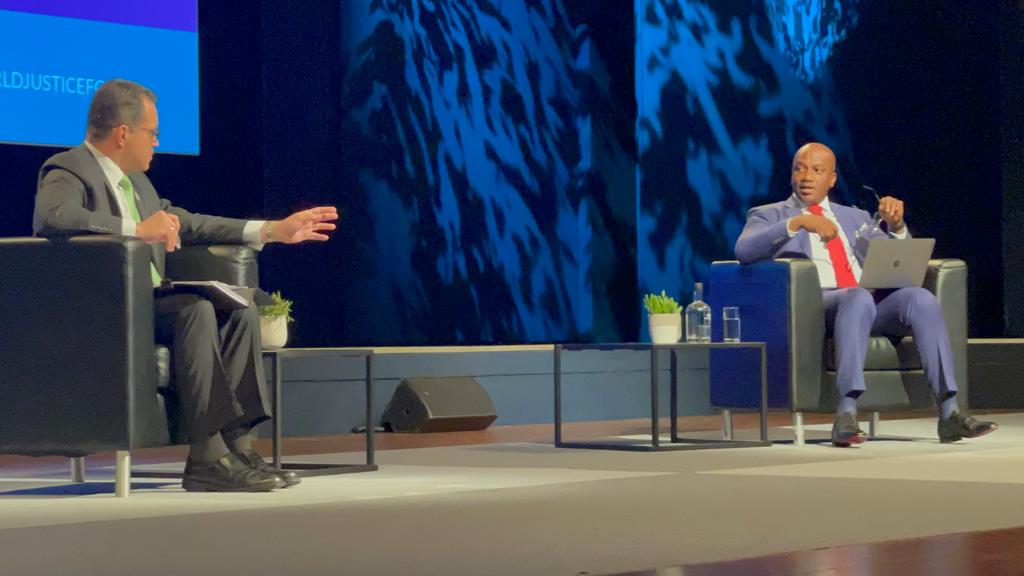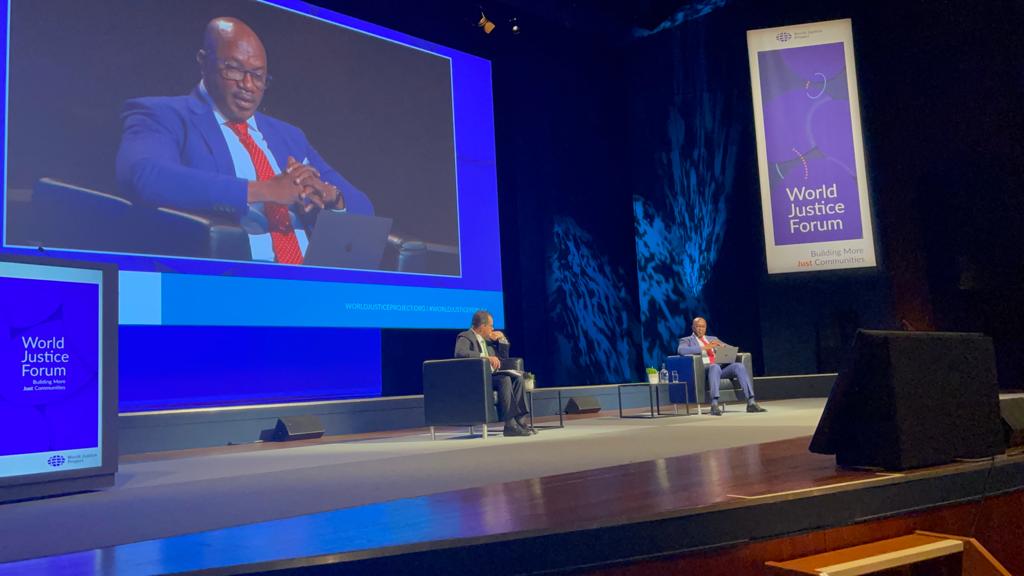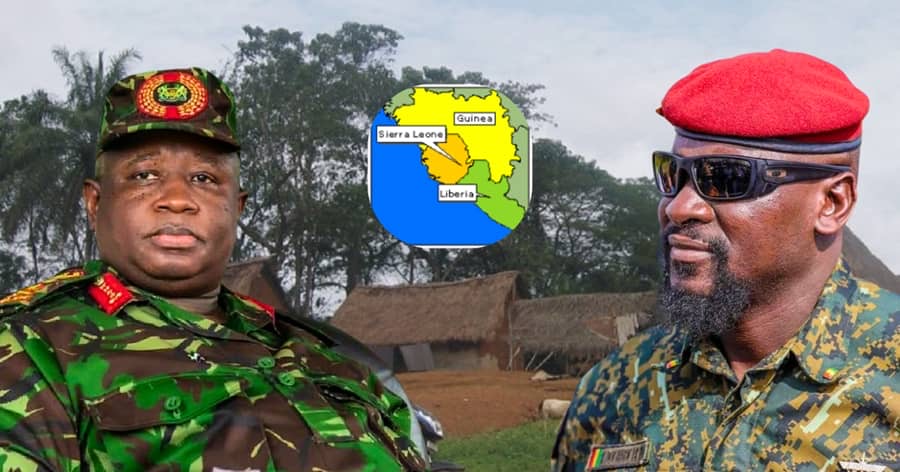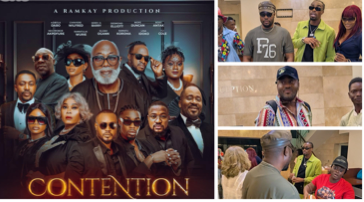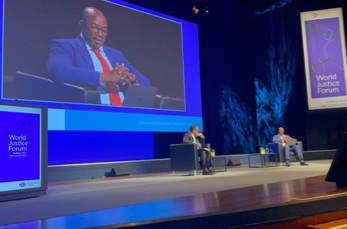
The Attorney General and Minister of Justice, Mohamed Lamin Tarawalley, underlined the government’s accomplishments and commitment in attaining SDG 16, the building of a peaceful, prosperous, fair, and inclusive global society, at the World Justice Forum in the Hague, Netherlands.
The AG noted that the government of Sierra Leone has made series of strides in this direction, adding that one of the government’s top priorities at the moment is a national action-oriented approach that seeks to advance the rule of law and access to justice in order to ensuring a well prosperous, peaceful, just and inclusive society.
“The Government of Sierra Leone has made tremendous strides in addressing various justice demands that touch and concern the socio-economic and political wellbeing of its subjects.”
He highlighted that among these are meaningful improvements in the areas of: free quality education, school feeding programmes; national water resources management mechanisms; reformation of the citizenship law to end discrimination against women who could not pass on citizenship to their children; adopted policies and laws aimed at strengthening gender equity and protection and guarantee women’s empowerment; development of laws eliminating inequality and discrimination; increasing of the maximum penalty for rape and sexual penetration of a child decriminalisation of half a century libel law by virtue of the amendment of Public Order Act (POA) 1965 that used to criminalize freedom of expression; the lifting of the ban on pregnant girls attending schools and the abolition of the death penalty and strengthening of the protection of the right to life.
However, conscious of the damaging impact of corruption on justice and rule of law, the Minister of Justice explained that the the Government of Sierra Leone has put a robust fight against corruption.
In the fight to eradicate extreme poverty and sustain socio-economic development, he said “the Government of Sierra Leone legislated the Anti-Corruption Act in 2000 which was repealed and replaced by the Anti-Corruption Act of 2008 as amended in 2019.”
The Act gives prosecutorial powers to the ACC against any government minister or any senior public official without recourse to the Attorney General and Minister of Justice as it used to be the case.
The 2019 Amended Act increases the fines, sentences and other powers of the Commission. The President himself and all Government officials have to declare their assets while in office on a regular basis.
Furthermore, he said the government took further steps by setting up three independent Commissions of Inquiry (COI) to combat corruption, bring accountability in governance and foster economic growth for the people of Sierra Leone.
He said the COI completed its findings and made adverse findings against the previous administration. Adding that most of these persons of interest at the COI are having their appeals heard before a fair, independent and competent Court of Appeal in Sierra Leone.
Moreover, he said Sierra Leone has launched a new national anti-corruption strategy (NACS).
However, in terms of other relevant structural implementation indicators, the AG noted that “the Government of Sierra Leone signed on 9 December 2003 and ratified on 30 September 2003 the United Nations Convention against Corruption and signed on 9 December 2003 and ratified on 3 December 2008 the African Union Convention on Preventing and Combating Corruption and Related Offences.”
The AG maintained that the fight against corruption in Sierra Leone has been and, is radically entrenched and successful. He revealed that, countries in the sub-region such as Liberia, Ghana and Nigeria have sent researchers to come and study our anti-corruption strategies for onward implementation to their own countries.
“The indicator lights of these success stories speak for themselves. All thanks to the appointment of a young, robust and competent Anti-Corruption Commission (ACC) Commissioner, and the political and legal space given to him by the Government,” he said.
Transparency International 2019 Global Corruption Barometer for Africa identifies Sierra Leone as one of the success stories in the fight against corruption with 66% of Sierra Leonean believe the Government is doing a good job in the fight against corruption.
Prior to the appointment of the current Anti-corruption commissioner, the the Minister of Justice explained “Sierra Leone was in the position of 49% in the Millennium Challenge Corporation’s Control of Corruption (MCC) Scorecard which under his astute leadership and full support of the government, the country has moved to a comfortable and respectable position at 71%, 79%, 81% and an excellent 83% in 2018, 2019, 2020 and 2021 respectively.” Similarly, according to the Afro Barometer survey in 2020, corruption prevalence in Sierra Leone has reduced from 70% in 2015 to 40% in 2020.
He said President Bio led government’s strategy in the fight against corruption, have helped position the country on a firm and consistent path to sustainably keep corruption under control and set the stage for: accountability, effective service delivery, democratic good governance and sustainable development.
“This mode of fighting corruption and success stories have also made Sierra Leone to be selected for the Multi-Million Dollar US Government’s Compact award.” Also adding that today, Sierra Leone is one of the top ten Performers in the Lower Income countries, which is a sign of commitment to control corruption.
The AG reiterated that Corruption indeed has been largely responsible for poverty across the world which in turn is contributing considerably in stagnating justice and the rule of law.
With regards to engagement with Universal Periodic Process (UPR), the Minister of Justice that the Government of Sierra Leone has demonstrated consistent and effective engagement with the Universal Periodic Review (UPR) process in its determination to make progress on human rights promotion and protection. Adding that Sierra Leone is honouring its reporting obligations under the relevant human rights conventions.
At the just concluded 48th regular session of the Human Rights Committee, the AG said that “our 3rd Cycle UPR was adopted.” Sierra Leone accepted 216 of the 274-recommendations received, and took note of 58. He emphasised that the Government is committed to fully implementing all the 216 accepted recommendations to build a better human rights architecture in Sierra Leone.
Despite the unprecedented challenges of COVID-19, exposing member States to heightened vulnerabilities and to rethink delivery on the SDGs, “Sierra Leone in prioritizing Human Capital Development, as we continue to take action on our accelerated Goals, including SDG16 on peace, justice, and strong institutions,” the AG averred. He Further reiterated that Sierra Leone addressed the Second SDG Moment in the High-Level Week of the 76th UNGA session and presented her third Voluntary National Review report on the SDGs in 2021’s High-Level Political Forum (HLPF).
In the HLPF, “we reported on the action taken to scale up efforts towards operationalizing the Independent Commission for Peace and National Cohesion to foster social cohesion and further consolidate peace in the country, following the enactment of the enabling legislation and appointment of the members of the board of the Commissioner, embodying an institution that is representative and gender sensitive.”
The AG reveals that the Judiciary continues to expand access to justice with its presence established throughout the country.
“The Judiciary has had more judges appointed to address the acute shortage of judicial personnel, increase the capacity of courts to handle and reduce backlog of cases,” he revealed.
The AG said that there has been an expansion of legal aid services to indigent and under-served persons through the Legal Aid Board scheme which provided free legal representation, advice, and related services to over 400,000 Sierra Leoneans in 2020, recording a 93% increase from 2018. Special courts to fast-track cases for sexual offences, social security, corruption, and small claims were established.
At the international front the Minister of Justice said that Sierra Leone has graciously contributed to the strengthening of Justice and the rule of law at the international level as well. “At the international level, my country is deeply committed to the implementation of its international obligations.” Sierra Leone became 100th member of the United Nations in 1961 and ratified most of the major human right treaties or instruments, the foundation of which was built by the Universal Declaration of Human Rights (UDHR).
Sierra Leone is a signatory to: International Covenant on Civil and Political Rights 1961 (CCPR), International Covenant on Economic and Social and Cultural Rights 1966 (CESCR), the Convention on the Elimination of All forms of Discrimination against Women (CEDAW) 1979, the Convention against Torture and other Cruel and Inhuman or Degrading treatment or Punishment (CAT) 1984, the Convention on the Rights of the Child (CRC) 1989, the African Charter on Human and People’s Rights (ACHPR) 1981 and, African Charter on the Rights and Welfare of the Child.
“Most of these treaties have been domesticated in our country,” he said.
The Minister of Justice also explained that in a bid to curb impunity, Sierra Leone, after 11-years of brutal conflict, requested the United Nations to assist in establishing a Special Court for Sierra Leone to try and punish violations of human rights.
In 2002, a bi-lateral agreement was signed between the Sierra Leone Government and the United Nations to establish a Special Court with a mandate to bring to justice “those who bear the greatest responsibility” for war crimes, crimes against humanity and other violations of international humanitarian law committed in Sierra Leone since 30th November, 1996.
The Special Court was the first ‘hybrid’ international criminal court to be established – ‘hybrid’ in the sense that it involved a mixture of international and domestic laws and personnel. The said Court is described by independent international observers as a radical departure from the model of the ad hoc tribunals for the former Yugoslavia and Rwanda (ICTY and ICTR) on the one hand, and the International Criminal Court (ICC) on the other, and was welcomed by many as a potentially more effective and efficient form of international criminal justice.
The Special Court for Sierra Leone concluded its mandates in 2013 and a Residual Special Court for Sierra Leone has been instituted to continue to monitor the sentences of the Special Court.
The importance of the RSCSL in ensuring the legacy of the Special Court for SL through carrying out the numerous legal and practical obligations that did not end with conclusion of trial and appeal hearings cannot be over stated. One indictment remains outstanding- that of a former rebel leader Johnny Paul Koroma. The RSCSL continues to be an important legacy tool of deterrence in Sierra Leone where it has the confidence of the people of Sierra Leone. Respect for the rule of law, legislative reforms, capacity building and the court and its predecessor’s impact on legal and judicial proceedings in Sierra Leone are all part of its important legacy
On the international scene, the RSCSL continues to be a court of rich resource for international justice being the successor of a court of many firsts, the SCSL, and continues to be a useful resource contributor to the international criminal tribunals’ residual mechanisms
Further, he added “my country’s resolve to lend support in strengthening the International Criminal Court (ICC) to fight against impunity as part of its international obligations, a renowned Sierra Leone female jurist, Judge Miatta Samba, was elected as the 8th African woman to serve on the bench of the ICC. Justice Samba’s election to the bench of the ICC is described by many social and legal commentators as a victory for women legal professional acumen at both domestic and international level.”
In addressing sexual and gender-based violence, the Justice Minister said that President Bio during the General Debate in this 76th session of the General Assembly urged for global solidarity on access to justice and remedies for survivors of sexual violence. Based on his directive, the delegation of Sierra Leone requested the addition of the agenda item “International cooperation on access to justice for survivors of sexual violence”. The delegation of Sierra Leone is therefore to serve as lead sponsor of a standalone resolution on the agenda item in the General Assembly.
However, these successes are without challenges, according to the AG prolonged pre-trial detention is still a menace in the criminal justice system and civil actions. This he said to a large extent are due to rules of procedures to follow before trials. He also noted that capacity building in all spheres within the context of “access to justice” is also another challenge.
The AG reiterate that to gain global justice and strengthen the rule of law, “a great place to start is in our respective national settings.” He said the road toward a world of justice, prosperity and inclusiveness for all is not without assailants. “Often times, the surge in the demand for justice has been endless and seemingly impossible to redress. Therefore, we must draw the strings of our collective efforts together in bringing about peaceful, just and prosperous global society.”
He calls for all hands on deck as “justice exists for all but realising it goes with huge sacrifices.”
“As an optimist, I have all rays of hope that we will someday get there. So, let’s continue to act and to fight,” the AG implored.

